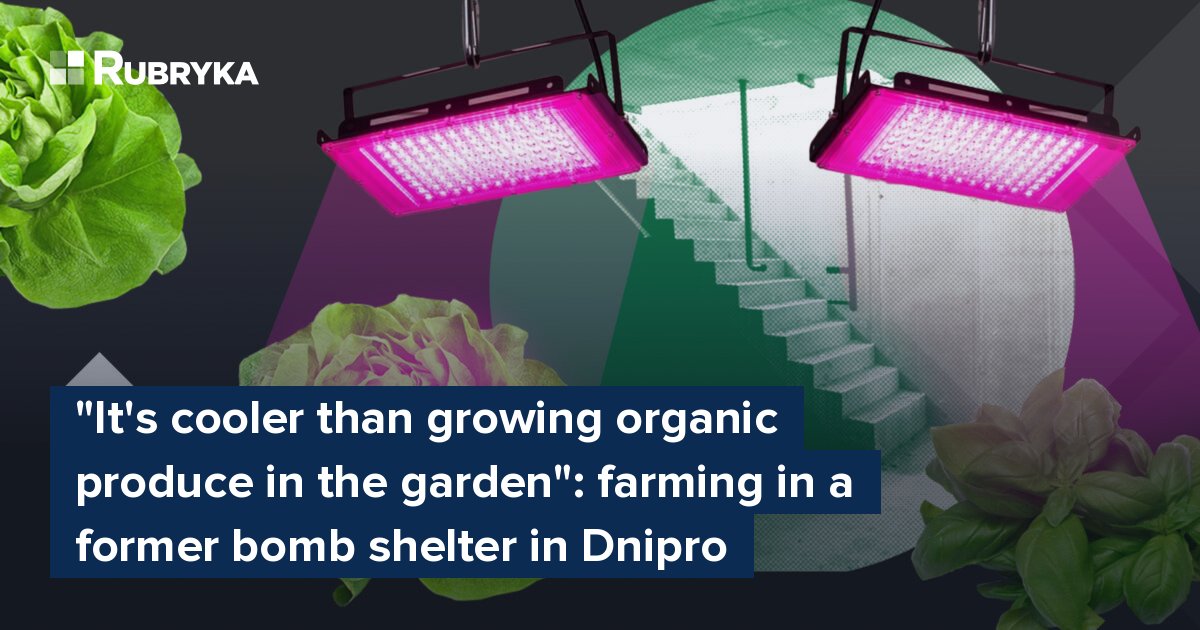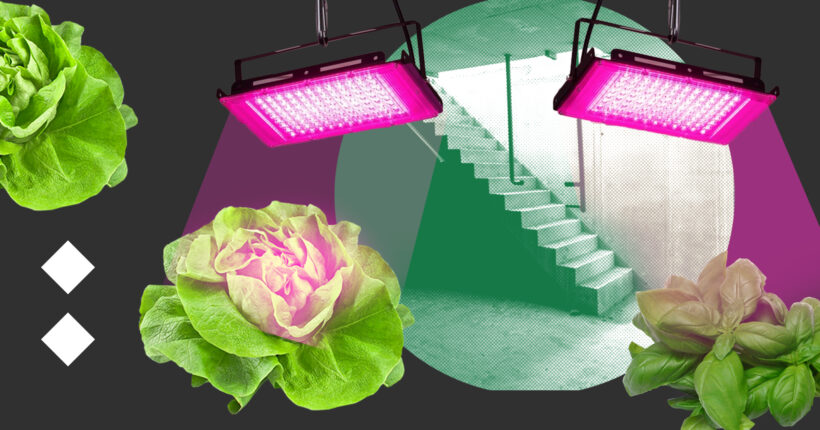
Arrangement of vertical farms
A small industrial zone among the Dnipro housing estates. Ahead are several heavy, creaky doors and stairs leading down. There is life under the building instead of a dark room. Shelves in the basement are full of different types of lettuce and basil — all thanks to an automated system that supplies enough water and light to provide the necessary nutrients to the greens.
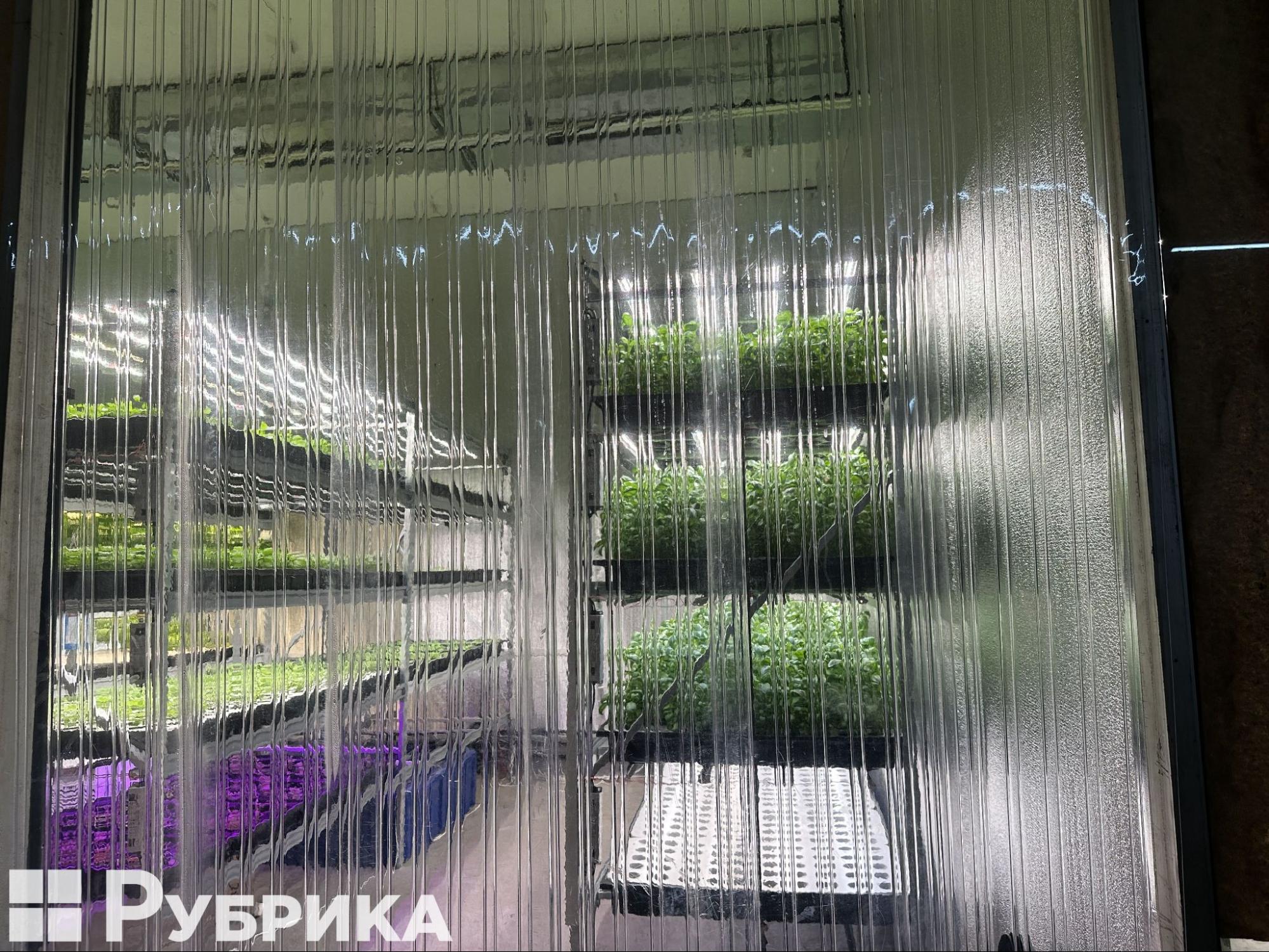
"This farm is a side effect of our business," says Victor Shuleshko. He gives a tour of the underground farm. "Doesn't it smell green?"
It really does. Indeed, even though it is a basement, everything looks like a greenhouse because of the moisture and the aroma of greenery. The system also has bubbling water, as if several streams are running by.
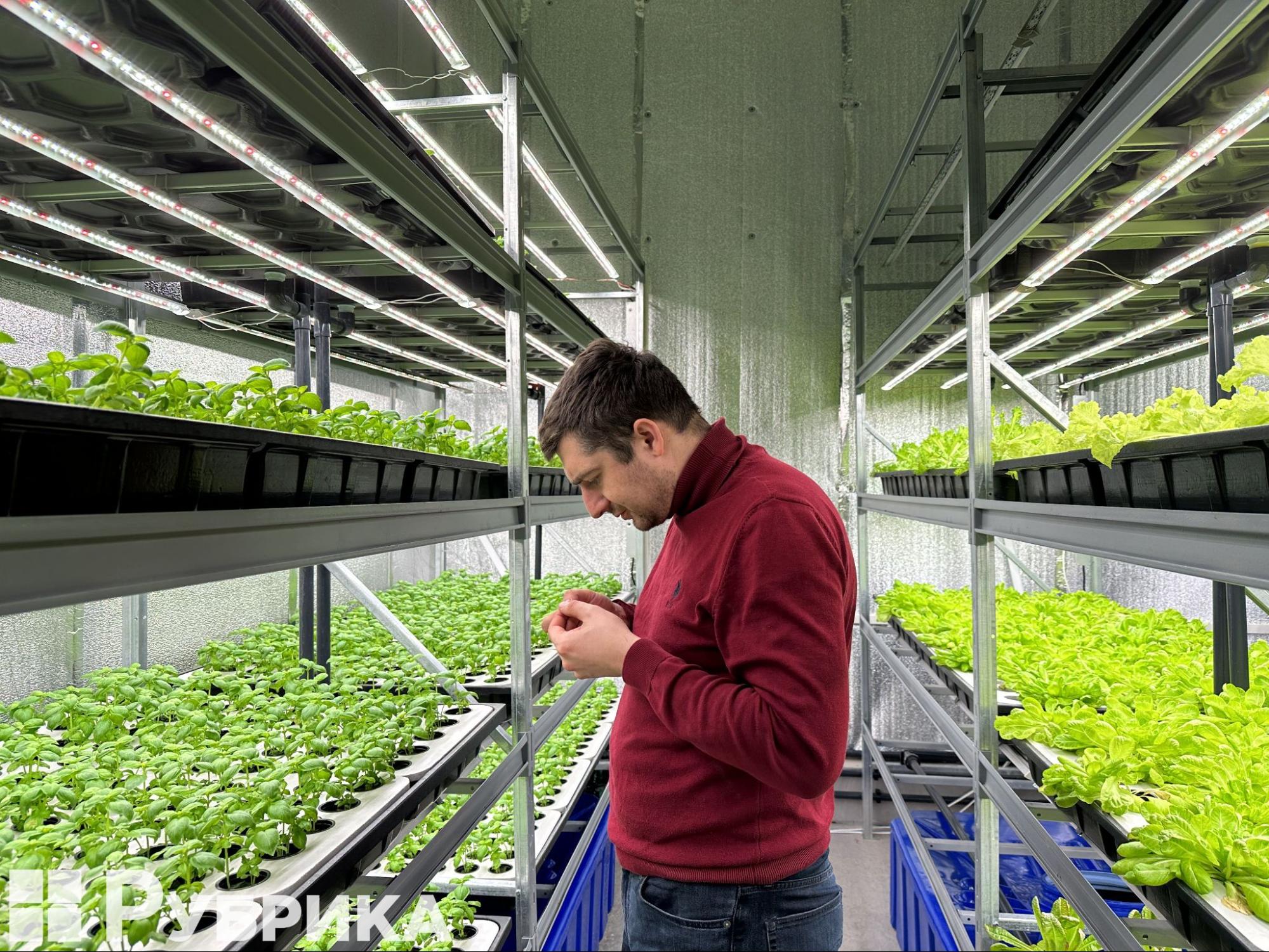
Shuleshko graduated from the university as a microelectronics technician. For several years he worked at a research institute until, at some point, he started dealing with LEDs and small equipment sales from China with a friend. From that, their business began. They had two sales points with equipment and made the lamps — everything was handmade.
Shuleshko, together with his partners, built his business around lighting. They made equipment for industrial enterprises — huge workshops and various shops but a few years ago, many competitors appeared in this segment.
"I realized that I should change something. I remembered those LEDs we were working on after graduating from the university. Among them, some glowed pink and were intended for agro-industry. I thought it was worth trying to work on," says Shuleshko.
The entrepreneur began to delve into this topic because it appealed to him even during his studies at the university. He proposed the idea of an agro-lighting business to his partner, but he did not believe in it, adding that it would not work.
"I am such a person that when someone says it is impossible, I will do it on purpose. This is a challenge for me. I do and check it as done," Shuleshko says.

Eighty thousand dollars were invested in the start-up of the agricultural lighting business. Various LEDs were selected and tested in a small laboratory. The businessman looked at the scattering angle and studied its spectral composition. "This is all physics, which I was well versed in," says the entrepreneur, who often had to sit over developments at night.
"We have been doing this for two years. And then there was the first tender, which the partners laughed at. They said we would close the direction if we did not go through it now. And we won!"
The entrepreneur installed lighting for half a million dollars. He says that he managed to win then, thanks to science. Shuleshko chose lighting that made the plants feel better and gave a bigger harvest.

After that tender, entrepreneurs received multiple orders.
"A customer had vertical farms with lettuce on 700-800 square meters but with low lighting. The farmer was looking for a way to improve the operation of the farm. We provided him with more than 13 types of different lights," the entrepreneur recalls.
After two months, the company asked if there were any results, and the response was stunning — the farm grew twice as much produce using the company's lights.
With the lights of 100 W they used before, the farm harvested 5 kilograms of products per square meter, and with the new one of 130 W — already 10 kilograms. This customer changed all the lights on his farm after the harvest.
With his partners, Shuleshko concluded that he should set up a laboratory where customers would be taken to show how the lamps work. There they could see how different light affects plants. And so vertical farms appeared, but at first, they were not in the basement but in an ordinary room next to the Dnipro airfield.
What is the unique feature of a vertical farm?
Vertical farm greens are sprouted from Dutch seeds. Each seed is wrapped in clay, making it easier for farmers to work with it. Shuleshko says they tried to use Ukrainian seeds earlier, but their quality was worse — fewer offshoots sprouted than from foreign ones.
Salads of various types and basil were chosen for planting. Each plant lives in its own cup, fed with water with special solutions.
"It's cooler than growing organic produce in the garden. Plants live on pure salts: potassium, calcium, magnesium, iron, zinc, and copper — a bunch of trace elements. The worst thing you can get from purchased salads or vegetables is poisoning with pesticides and herbicides. But we don't have that because we don't process the sprouts with anything. We don't have any bugs or worms," says Shuleshko.
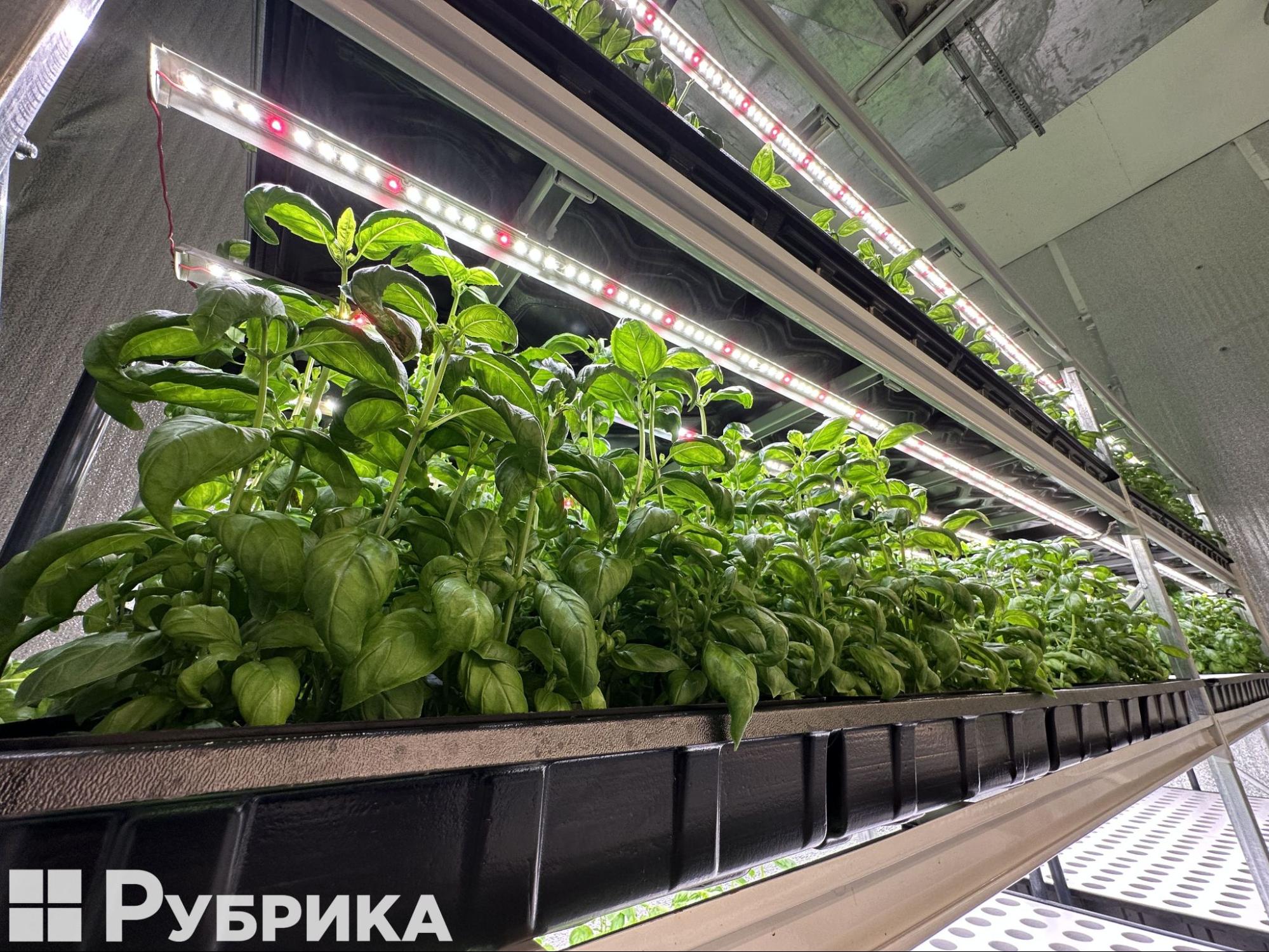
Plants in a vertical farm receive the same amount of light as if planted under the sun.
The entrepreneur explains that the entire system's profitability depends on the light's efficiency. We have a "12 by 12 hour" and "East-West" mode. At first, there is a gradual increase in daylight hours, then, on the contrary, a decrease. A plant is like a person — if it is asleep and you shine a bright light in its eyes, forcing it to wake up, its mood will deteriorate.
Each salad stand has its own power supply and lighting. Even the neighboring plants across the passage live in different conditions. Thus, Shuleshko says, studying the influence of light and nutrition on their lives is possible because a vertical farm is a laboratory, and the grown greens are a by-product of experiments that are not thrown away but sold.
The goal is to sell the greens in cups, not the leaves by the kilogram. "If you hand over the leaves in a group, they will cost $16 per kilogram. One sprout in a cup costs $0.8, making it $81 per square meter," Shuleshko explains the math.
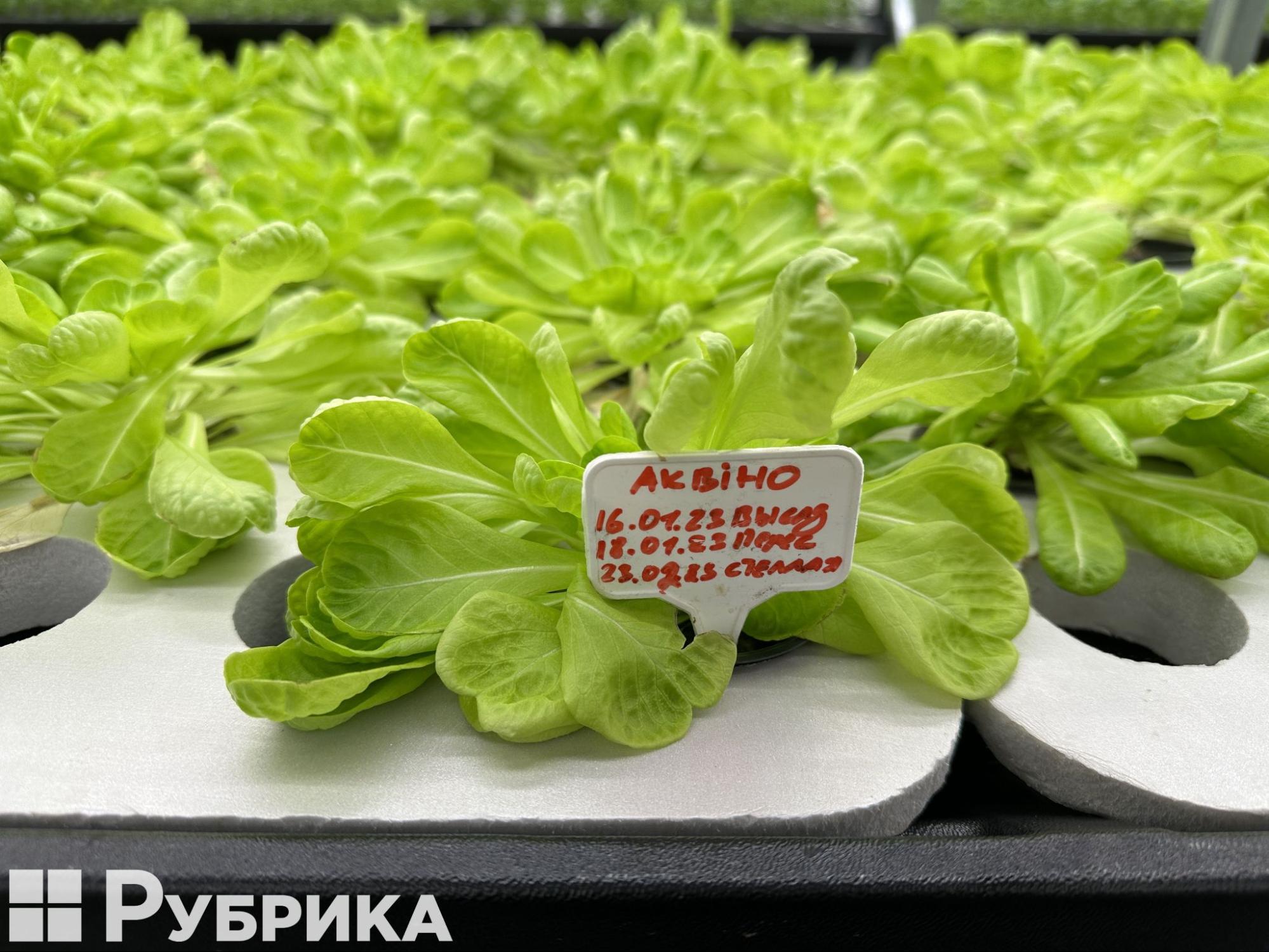
The entrepreneur adds the quality of the greens is not essential when paying for a band, and the main thing is the volume. On a vertical farm, each grown plant is valued.
"We told the dealers: if you do not give a normal price for our basil, we go directly to the buyers, and we left," Shuleshko says.
These greens grown on a vertical farm have appeared in several well-known shops and supermarkets in Dnipro. They are sold in the cups in which they were grown. Such a purchased salad can stay fresh at home for up to a week, and if planted in a pot, it will live for up to a month — such an experiment was conducted by one of the entrepreneur's acquaintances.
"We will deliver packages with several types of salads, basil. These models work in other cities. That's why we will go this way, probing the market," says Shuleshko.
The goal of entrepreneurs is to sell engineering solutions and technologies, for example, arranging a vertical farm for a customer adjusted to a particular plant. The company knows all the operating costs and other details thanks to the laboratory.
"We also sell mixing units, lamps, and the systems themselves. One should know where to put the received greens to sell such systems in Ukraine. That's why we work with sales," says Shuleshko.
How the farm moved to the basement
The enemy shelled the Dnipro airfield on the first day of the full-scale invasion — February 24, 2022. The missile hit it in the morning. At that time, the vertical farms were in a room close to the airport.
"For the first time, our roof was cut off. The second time it was the glass. Each time, with each hit, it got worse, until after the next shelling, almost everywhere the ceiling collapsed," Shuleshko recalls.
Employees no longer wanted to go to the laboratory, and Shuleshko had to visit it himself. Then the entrepreneurs decided to leave that premises, taking all the things. In the first weeks after February 24, entrepreneurs took up what the whole of Ukraine was doing at that time — volunteering.
The company started making plates and sewing plate carriers. More than 3500 items were distributed free of charge. About 500 people were involved in volunteer production, a hundred of whom were sewists. Four months later, the company began to return to their work. They found new premises in the summer and set up the vertical farms there.
There were only 24 squares for cultivation in the old premises, in the newly rented one already more than 200. The greens got a new home, but underground. At least $15000 had to be invested in the basement arrangement. This underground facility is privately owned by one of the Dnipro companies and is not listed as a shelter on the bomb shelter map.
"When there was heavy shelling, people from neighboring businesses came to us to hide. We conducted tours for them and fed them salad," says Shuleshko.

Even though they are now underground, the sprouts feel great, thanks to proper nutrition and lighting. Soon, says the entrepreneur, they will expand their line, and there will be more racks with plants.
"Two people come here to work. There is a chief technical specialist and employees who help harvest and plant seeds," says Shuleshko.
The automated system can remain without human supervision for several days. Everything works like clockwork.
"Once, we left Dnipro for a couple of weeks, and when we returned, everything was growing well. We even have time-lapse videos of the laboratory, showing how the greens are flourishing without human participation. Modern technologies are awe-inspiring," concludes Shuleshko.
Newsletter
Digest of the most interesting news: just about the main thing



